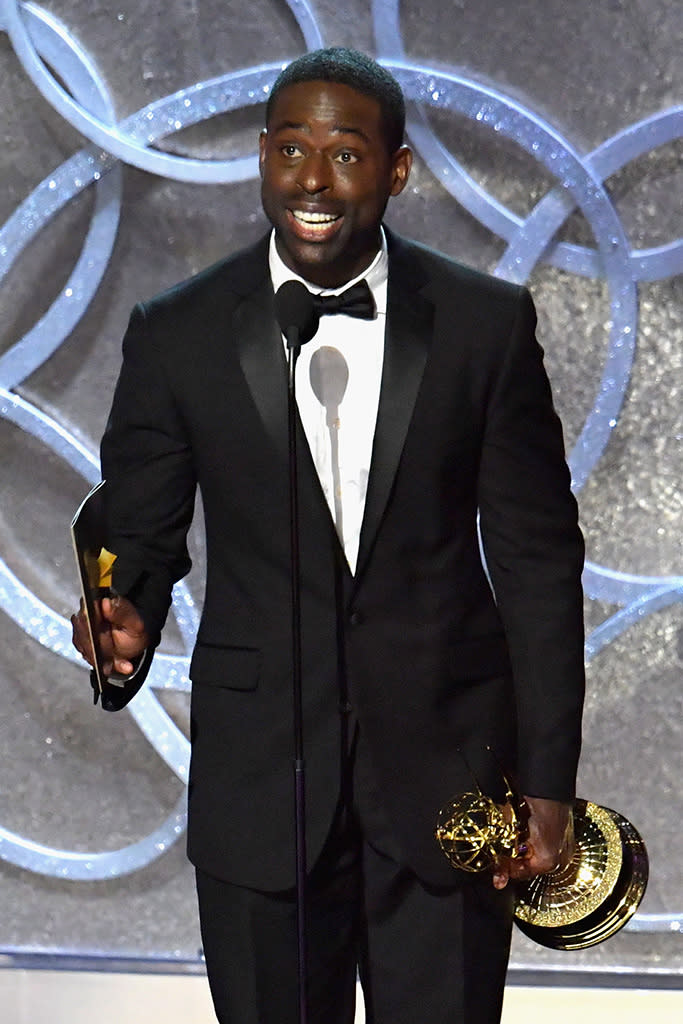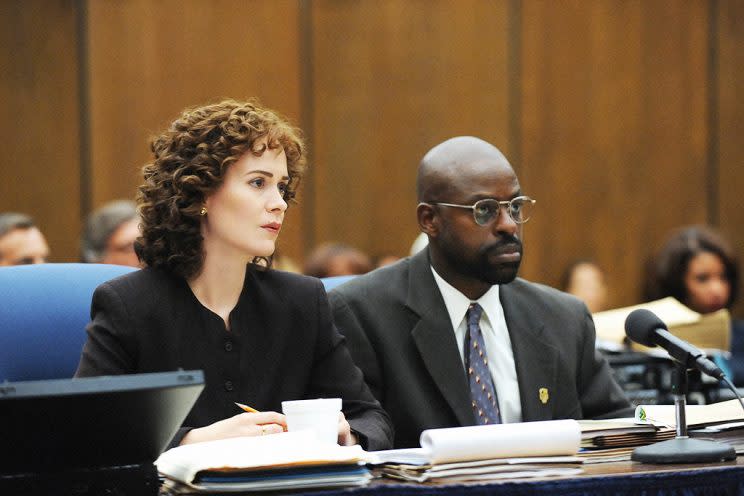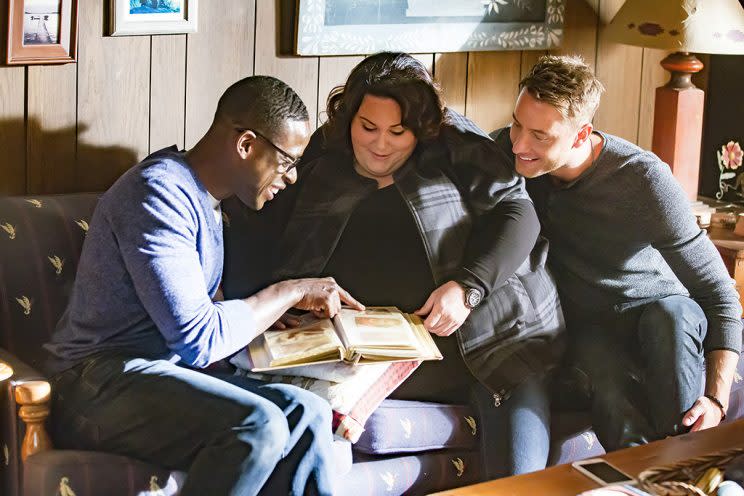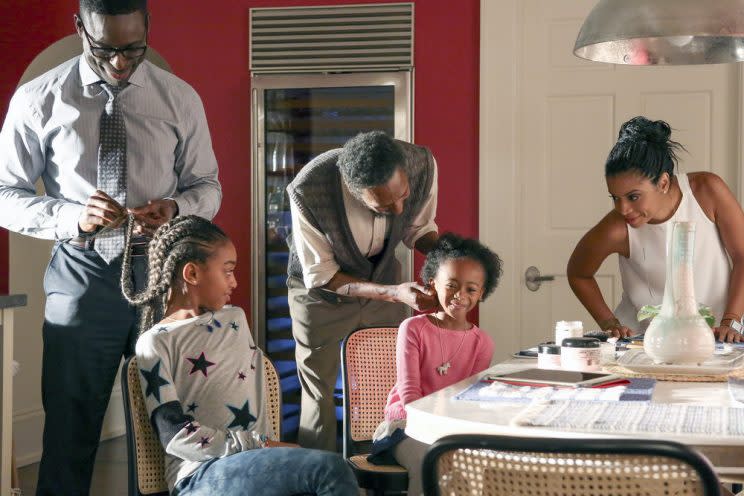Sterling K. Brown Talks the Power of His 1-2 Punch: ‘The People v. O.J. Simpson’ and ‘This Is Us’

Most actors consider themselves pretty lucky if they book one hit TV show in their career. Sterling K. Brown has managed to double down on his good fortune by stealing scenes in not one, but two well-received series in 2016 — FX’s The People v. O.J. Simpson: American Crime Story (as Christopher Darden) and NBC’s This Is Us (as Randall Pearson). Taking home his first Emmy, for Outstanding Supporting Actor in a Limited Series or Movie, last September was icing on the cake.
“It is an embarrassment of riches,” Brown admits. “And I’m trying to enjoy every minute of the journey. It is certainly what I went to school for and what I’ve been working toward for years, but I don’t know that you expect this kind of professional serendipity to ever really happen. I’m not even sure you let yourself think it is a possibility.”
In honor of beating the casting odds, Brown discussed his dynamite year, what it means to take that winged trophy home, why he was drawn to the characters and what he did to bring them to life on screen, and why it is important to him to deliver a message through the medium.
You have been around accruing professional credits for more than a decade as fans of Third Watch, Supernatural, Person of Interest, and Army Wives, but it certainly seems like you ratcheted it up a notch in 2016. Do you feel like you broke through some previous ceiling professionally?
It’s been a good year. The level of recognition that has come from the work this year has far surpassed anything that happened prior to this point. I can remember preparing for the audition for People v. O.J. and thinking that this could be a pretty interesting character. After I came out of it — because I knew Sarah [Paulson] and [John] Travolta were already attached — I said to my manager, “Look, they’ll more than likely play a name game, but in the event that they don’t, I think I have a shot.” That was January 2015. I didn’t hear anything about that project until April 2015. In those three months, I thought it had come and gone and ah, c’est la vie. Such is life. Then it came back. I went in to read for producers Brad [Falchuk] and Nina [Jacobson]. Ryan [Murphy] was off getting Scream Queens underway in Louisiana. When I found out that I was the only person that they called back for the role, I was in shock. Later on that night, I got it. It just took some people taking a chance on someone who doesn’t have that same level of recognition as everyone else to give you a new level of opportunity, to open up doors that weren’t open up to that point in time. It’s been a blessing from that point on.
Did O.J. help you snag This Is Us?
[It] came right after that. I know a lot of people are saying, “How do you follow up The People v. O.J.?” When I got a chance to read Dan [Fogelman]’s script, I told my manager, “[This Is Us] is the best network television pilot that I’ve ever had the opportunity to read.” And so the fact that they were excited to see me because they were familiar with my work from O.J., and that doors were beginning to open in a way [they never had], was huge. Before, I had to constantly prove that I was good, prove that I was able. Now, people sort of greet me with their arms a bit more wide open, saying, “Oh, we know this guy can do it. Let’s see what his take is.” It is invigorating because you step into a room and people are already meeting you with a certain degree of receptivity. That’s a very comforting feeling to walk into the room with the benefit of the doubt. People are looking at you with an eye toward success rather than an eye toward skepticism. It takes a lot of pressure off. It gives you freedom to show them how you interpret the character. So yeah, that’s the long-winded answer. It’s been a very good year. [Laughs]
That must boost your confidence level going into auditions, even with people you’ve never met before.
There’s that increased confidence, but there is also a real difference in perception that I will gladly take. [Laughs] Gladly. I feel like I’ve been solid in what I’ve done for a while. But when other people don’t know who you are, the perception is like, “He was good, but let me see what so and so is up to first.” There’s a list of names that precede Sterling K. Brown that people go to first. They’d be like, “All right, if they’re not available, then we’ll see.” I can’t tell you how many pilots I’ve had an opportunity to get where they wanted to test me, and they then went straight off to someone with higher name recognition. But maybe I have moved up a few slots on the list.

Winning an Emmy helps move the dial for casting people, too. Thinking back to Emmy night, how did it feel to hear your name called?
It was surreal. It was incredible and it was magical and wonderful. It was hard to believe. I remember the feeling of walking up on stage and seeing people standing up for the performance and standing up for the recognition. I remember feeling overwhelmed and overcome by love in the most sincere way possible. Not just in the auditorium, but [from] my family and friends watching in St. Louis and New York and all over the country. I felt just inundated by love and it was an incredible feeling.
Did you think you were going to win?
Not necessarily. I didn’t know what to think. I had so many people tell me I was a frontrunner and that I was an odds-on favorite, but in my mind I was the least known person nominated in my category. There were three of us nominated from our show, so we could have easily split the votes up amongst ourselves. So the fact that my name was called was delightfully surprising.

What drew you to the role in The People v. O.J.?
I remember 21 years ago when it was all going down just how vilified Darden was in the black community. I was at Stanford University, a freshman, and nobody liked Darden. Like all the names you could call somebody who was black who you didn’t think deserved “to be black,” those were the names that got cast towards this particular individual [whereas] Johnny Cochran was like a hero. Defending O.J. Simpson was like him defending me or any other black man. We didn’t draw a socioeconomic distinction at that time. We just saw a black man that the criminal justice system had to take down. So 20 years later, to get to revisit that trial from the prosecution’s standpoint was a very interesting prospect. As an actor, you can’t judge somebody and play them at the same time. It was a real godsend for me to release all the judgment that I had towards Darden and to see him as a man trying to do a job to the best of his ability. To see how he handles the job with integrity was really quite wonderful because it took a lot of gumption for him to take on that trial, to stay with that trial, to receive death threats, and be called every name in the book. He saw it through to the end. I give him a lot of credit for that. He had a brother who died from AIDS — something we weren’t able to touch on in the show. He was diagnosed with AIDS while he was in the trial. So he would normally go up and down to the Bay Area to visit his family, but he wasn’t able to do it to the same extent he was when the trial wasn’t going on. It was a point of frustration for him, but he didn’t quit. Darden deserves all the credit in the world for seeing it through.

And This Is Us?
Well, Dan Fogelman can write his ass off. That’s No. 1. Reading that script, I laughed out loud and cried. I felt all the things that people have been feeling since they watched the pilot. Those things were readily available on the page. To have an opportunity to be a part of writing that good was a dream. The fact that he wanted to meet with me was a really fortuitous situation because John and Glenn, our directors, had just got finished working with me on Whiskey Tango Foxtrot. They told him, “You have to meet this guy, Sterling K. Brown.” Fox [which produces This Is Us] was a studio that I’d already been working with on O.J. So there was a lot of love in my favor going into the meeting for this project.
What has reaction to that show been outside of the business?
My family, most of which is from Missouri, watched and really enjoyed it. They’re like, “Yo, O.J. was good, but this is the one.” I was talking to my sister earlier today, and she was saying, “I think they’re trying to do something different with this show, bro. They’re trying to elevate television.” She’s a very strong Christian. She says, “I know it’s not a Christian show, but I feel like this show ministers to me. It’s like energy.” People are moved. People are really touched. And it’s striking a chord that not a lot of other things on TV are doing, and it feels really awesome to be a part of it.

I think one thing people have really latched onto is the relationship that Randall and his wife, Beth, have and how invested he is in her well-being and that of his children. Is there some secret to getting that relationship so perfect?
Susan [Kelechi Watson] and I have a wonderful relationship. We went through grad school together at NYU, so we knew each other coming into this project. Getting a chance to work with her now is a real joy. We’ve received a great deal of feedback with regards to our relationship. Being African American, it’s really nice to see a couple represented that’s together, that’s in it, and that feels very solid. There’s going to be some trials and tribulations like in any marriage, but these two people aren’t going anywhere. To get a chance to depict that, to be able to put that image into the world, feels important. Selfishly, I like it because the writing is so good. We get some of the best scenes, her and I. Dan and our team of writers week in, week out, it just keeps on going.
You brought up the image Randall puts out in the world — a smart, successful black man living in a good neighborhood who is happily married and contributing his fair share to raising his children. He’s even a mostly healthy eater, and we’ve seen him exercising and drinking smoothies. Obviously, the show is a good show, but is it important to you that the roles you take on also have a message or offer a deeper impact on the audience?
It is. You can never underestimate the power of imagery and people’s desire to see themselves reflected in media. As a father of two kids, I look at billboards and print ads all the time and I watch them with a different eye. When your children don’t see themselves, then there’s a tendency to undervalue one’s self. So the fact that I get a chance to be a part of this wonderful show playing this successful man in work and in home is huge. I’ve gotten a lot of feedback saying, “Keep on going with what you’re doing with Randall. This character’s important. And not just because you act him well, but because of what he represents and what he stands for. So I’m with you.” That’s special. That hits me harder than an Emmy.

Darden is obviously a real person, which means there’s a person to meet, video of him and his mannerisms, and a responsibility to get stuff right. Randall is a fictional character. Does that allow you more freedom to put your creative stamp on him?
Darden being a real-life human being, who is alive and well and living in the city in which I currently live and still practicing law, [made me] very cognizant of the fact that I could run into him at any given point in time. I was very hopeful that if and when he saw the performance that he would recognize a kernel of himself within my performance. So I definitely poured over a lot of tape, watched as much trial footage as I could and as many interviews of him. I read his book repeatedly to try to understand where he was in his mentality at the time of the trial, leading up to the trial, and throughout the course of it, which I found very gratifying. It was something solid that I could anchor the performance to. There was always freedom within form because I wasn’t going for an exact imitation, but trying to evoke the essence thereof. The train tracks were very well established.
With regards to Randall coming from the writers and my own imagination, it was very freeing. There is a lot more of myself that I could probably lend to creating Randall as opposed to creating Darden. We both have two children, are married, and are relatively successful in our chosen career paths, Randall probably more so than myself. We also have our individual issues of paternity. I lost my father when I was 10 years old. Randall has been without Jack for quite some time and is also connecting with William [played by Ron Cephas Jones] for the first time in 36 years. The parallels lent themselves to stepping into Randall with a fair amount of ease. I enjoy using my imagination. But I also enjoyed the minutiae of trying to get Darden as right as possible.

Is one or the other more challenging to you? Do you have a preference for playing real people versus fictional?
I don’t know that one is more difficult than the other. I would probably say Darden took more time to create because it was very specific, and Randall is still sort of being evolved as I evolve with the character. I enjoy both. I’m not going to pick one. It’s apples and oranges.
Your shows have kept us entertained most of the year. So what excited you on TV this year? What is your must-watch show?
Well, Game of Thrones is No. 1. GOT this season was ridiculous. Like, they had arguably the best two episodes of television of the year, and they were their last two episodes. I watched Episodes 9 and 10 over and over trying to figure out which one is better. “Battle of the Bastards” is one of the most ridiculous fight scenes I’ve ever seen. It was crazy. It was crazy. It’s up there with, like, Braveheart, you know what I’m saying? The way that they closed it off with the big finale, it was like a poem. So Game of Thrones is at the top of my list.
This Is Us airs Tuesdays at 9 p.m. on NBC.
